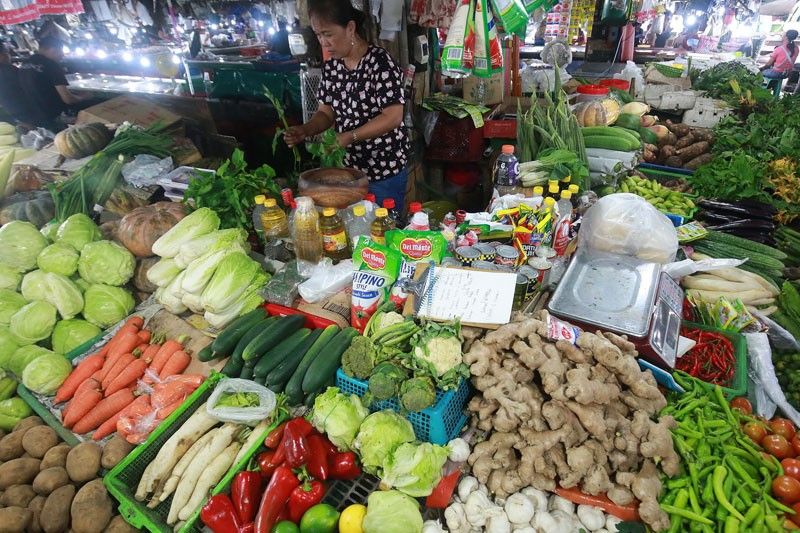Inflation seen to ease in fourth quarter of 2018 despite Ompong impact

MANILA, Philippines — Despite the onslaught of Typhoon Ompong so close to the holiday season, inflation is still expected to ease in the fourth quarter, economic managers said yesterday.
In a press briefing, economic managers expressed confidence that Ompong’s impact on food prices may ease with the implementation of non-tariff measures meant to address supply woes as well as the expected strengthening of the peso versus the dollar that can make imports cheaper during the fourth quarter which traditionally sees higher consumer demand.
Bangko Sentral ng Pilipinas Deputy Governor Diwa Guinigundo said that based on initial estimates, the damage inflicted by Ompong is confined to certain areas and has no widespread effect to the economy.
“Based on the preliminary reports, the impact of Typhoon Ompong is basically isolated and confined to certain areas. So we don’t see generalized effects on the supply logistics or even in terms of production.”
On Monday, the Department of Agriculture reported that damage to agriculture has reached P14.27 billion, with the rice sector hit the hardest.
Guinigundo said they are counting on the immediate implementation of inflation-busting non-tariff measures meant to boost the supply of key food products, especially for rice which accounts for more than nine percent of the consumer price index (CPI).
Among the non-tariff measures included in a proposed executive order is the immediate importation of more rice as well as the immediate release of 4.6 million bags of rice from warehouses of the National Food Authority (NFA) to retail outlets to eliminate the participation of traders.
He also noted that harvest in several provinces has already started, contributing to supply.
“With respect to the rice industry, it is true that this is the lean season. But it some areas, harvest has already started. so the impact on rice would be minimal,” Guinigundo said.
Guinigundo also expressed optimism that the rice tariffication bill, which provides for the liberalization of rice trade, would be passed soon.
“Rice accounts for more than nine percent of the total CPI basket so to the extent that we have more than enough supply of rice I think we can expect some mitigation provided. And hopefully, the rice tariffication bill can be approved in Congress,” he said.
The seasonal appreciation of the peso against the dollar is also be expected to provide relief from soaring prices as import costs for goods may go down.
“The other point is that while it is true that the last quarter of the year is a high demand quarter given the holiday season, but this is also the time when the exchange rate actually appreciates and that could have some countervailing impact on the depreciation of the peso that we have seen in the nine months of the year. So that can provide some mitigation,” said Guinigundo.
Finance Secretary Carlos Dominguez said they are still waiting for the final report on typhoon damage but said the goverment can tap a loan facility with the World Bank to deal with damage caused by Ompong.
The National Economic and Development Authority said it will formulate a rehabilitation and recovery program (RRP) for areas struck by Ompong.
Socioeconomic Planning Secretary Ernesto Pernia said current inflationary pressures are “transient” and can be addressed with the proposed non-tariff measures.
The inflation control executive order (EO) submitted by the government’s economic development cluster (EDC) to President Duterte would focus on the removal of administrative and non-tariff barriers on the importation of key food items such as rice, fish, sugar, meat and vegetables.
Economic managers want the removal of non-tariff barriers for these food items done within the month to boost supply and drive down prices.
The economic development cluster recognizes that the rise in prices of these items has been the major contributor to inflation for the past two months. Fish and seafood, rice and meat, and vegetables accounted for 2.4 percentage points out of the 6.4 percent inflation rate in August.
Immediate to short-term measures contained in the proposed EO include making rice available in the market through immediate release of stocks from NFA warehouses, importation, and distribution of projected harvest; monitoring of rice transfer from ports to warehouses and retail outlets; and the speedy passage of the Rice Tariffication Bill.
Availability of fish and chicken would be increased by allowing imports to be distributed quickly and by setting up public markets with cold storage facilities where producers can sell directly to end consumers. Apart from importation, improving logistics, transport, distribution, and storage was also deemed crucial for curbing price inflation of sugar, vegetables, and other food items.
- Latest
- Trending



























